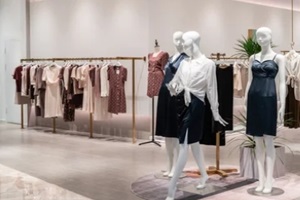 As one of the biggest industries in the world, fashion provides designers with many opportunities but also certain risks. However, business insurance can protect small fashion brands from common risks that could cause financial or reputational harm.
As one of the biggest industries in the world, fashion provides designers with many opportunities but also certain risks. However, business insurance can protect small fashion brands from common risks that could cause financial or reputational harm.
Whether you have a bridal shop, women’s clothing store, upscale boutique, or an online presence, the right insurance policies can help keep your operations running smoothly.
Discover some of the most common challenges that small fashion brands in Hawaiʻi face and which policies designers need to protect themselves from significant losses.
Common Risks and Challenges Faced by Small Fashion Brands
Small fashion brands face a variety of risks unique to the industry, including:
- Seasonal Variability: It’s common to have fluctuations in consumer demand from season to season as fashion trends change. This seasonal variability can create challenges for designers when forecasting sales and managing inventory.
- Intellectual Property Infringement: In the fashion industry, designers are always at risk of accidental intellectual property infringement, such as the unauthorized use of trademarks, copyrights, or designs.
- Supply Chain Disruptions: Unexpected interruptions in the supply chain, such as delays in production or sourcing raw materials, can result in lost sales and business growth opportunities.
- Product Quality and Recalls: When designing products to sell, designers must properly manage quality control issues, such as product safety concerns or defects in manufacturing, which could put their brand at risk.
Benefits of Having Insurance for Designers
For designers in Hawaiʻi, business insurance offers several benefits for fashion brands, including financial protection against unforeseen events.
Without insurance, a business could be held liable for significant out-of-pocket expenses to replace damaged inventory, defend legal claims, or compensate for business interruptions.
Business insurance can also help businesses mitigate common risks inherent to the industry, such as product recalls, supply chain disruptions, cybersecurity threats, and intellectual property disputes.
When an unexpected event like a fire or natural disaster occurs, a business could be forced to temporarily close.
Insurance plays a key role in maintaining business continuity during times of crisis. Having this financial support can help minimize downtime and help businesses recover financially.
Essential Insurance Policies for Small Fashion Brands
No small fashion brand should be without business insurance. Some essential policies that designers should consider carrying include:
General Liability Insurance
 Also called business liability insurance, general liability insurance (GLI) protects businesses from general claims that involve property damage or bodily injuries. GLI can help cover attorney fees and medical expenses that arise from these events.
Also called business liability insurance, general liability insurance (GLI) protects businesses from general claims that involve property damage or bodily injuries. GLI can help cover attorney fees and medical expenses that arise from these events.
Professional Liability Insurance
Professional liability insurance provides coverage for businesses at risk of negligence claims from clients or customers. As a small fashion brand, you provide a professional or contractual service to your clients.
Professional liability policies cover personal injury, copyright infringement, and mistakes or negligence that may occur as a result of you doing business.
Property Insurance
Commercial property insurance protects a company’s physical assets from covered perils, such as vandalism, theft, burst pipes, and storm damage.
This type of policy covers the building itself and assets both inside and outside. This may include computers, equipment, furniture, inventory, important documents, fencing, exterior signs, and more.
Cyber Liability Insurance
If your small fashion brand has an online presence, cyber liability insurance is a must. This type of coverage protects businesses in the event of a data breach that involves sensitive customer information, such as credit card numbers, driver’s license numbers, Social Security numbers, and other private data.
Business Interruption Insurance
Business interruption insurance can be purchased as a standalone policy or as part of a property insurance policy. It generally covers lost income and operating expenses for a specific period of time in which the company was closed or unable to operate normally due to a covered peril.
Coverage may also cover compensation for employee payroll, mortgage or rent payments, taxes and loan payments, and relocation costs.
Commercial Crime Insurance
While every small business owner wants to trust their employees and those around them, it’s important to understand the risks of hiring workers to perform on your behalf.
Commercial crime insurance protects against financial losses that can occur due to third parties, such as a break in, or internal staff such as employee dishonesty, forgery, computer fraud, or the theft of a client’s property.
Commercial Umbrella Insurance
 Commercial umbrella insurance is designed to cover large and unexpected events that could have devastating effects on a business’s finances and reputation.
Commercial umbrella insurance is designed to cover large and unexpected events that could have devastating effects on a business’s finances and reputation.
This type of policy provides supplements to your existing policies, such as general liability and auto liability. If a covered event occurs and costs more than your standard policy’s limit allows, commercial umbrella insurance can step in to cover the rest.
Trust Atlas for Competitive Insurance Solutions
Fashion is a fast-paced industry that can be highly rewarding, but also risky. At Atlas, we know the risks associated with fashion brands, especially in Hawaiʻi, and offer comprehensive risk management services to minimize these threats.
Get in touch with our local team and let us tailor an insurance package for your small fashion brand.
